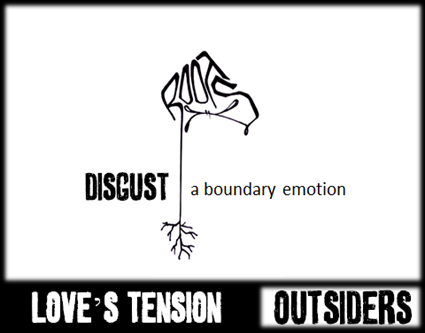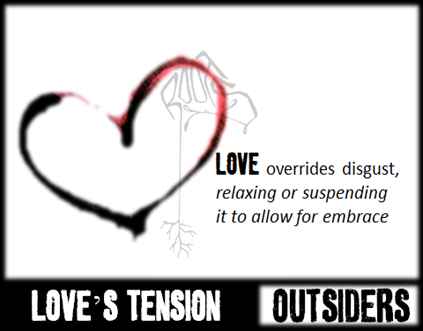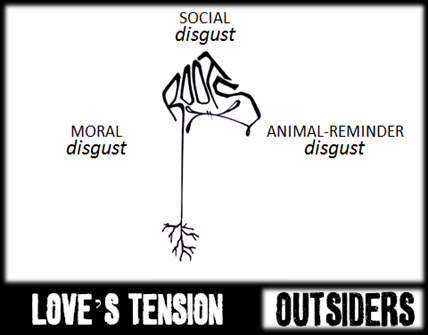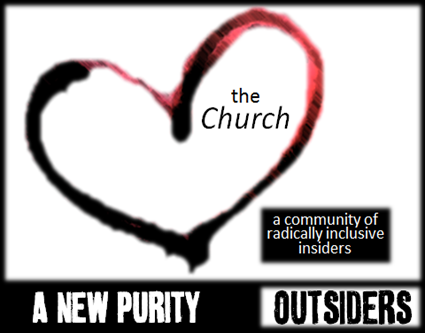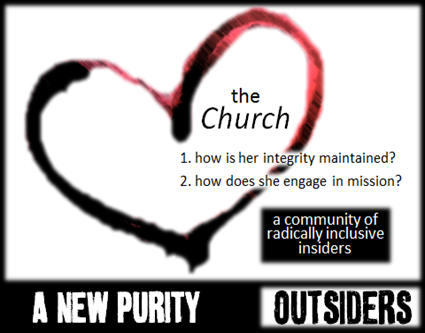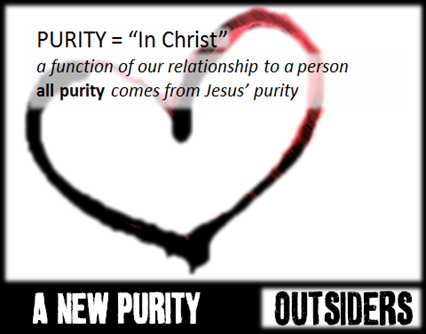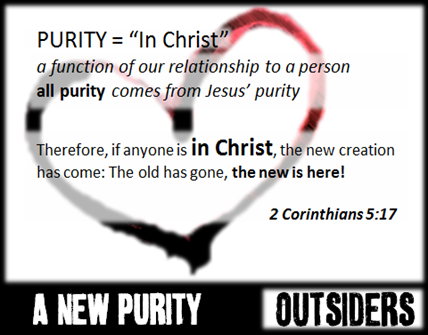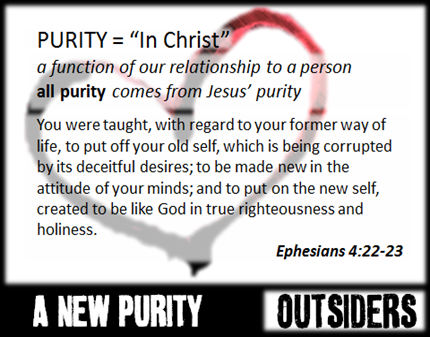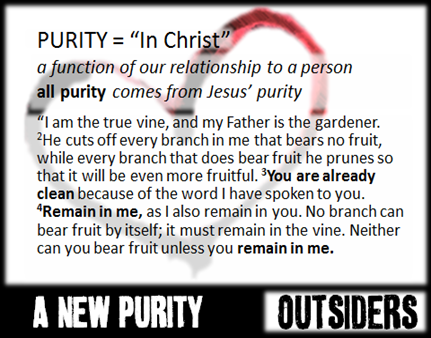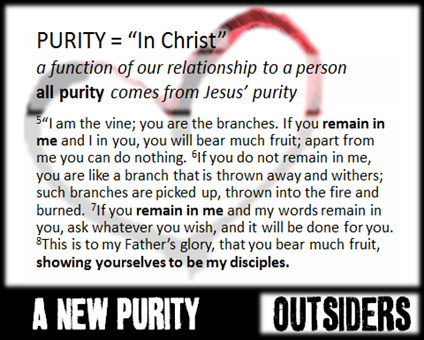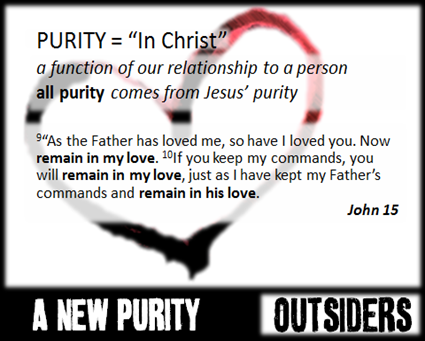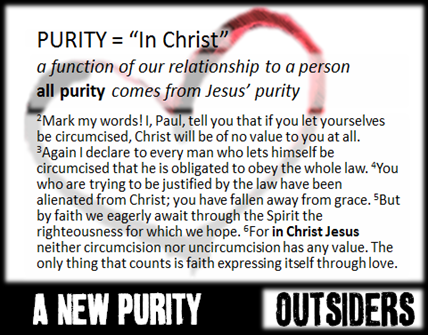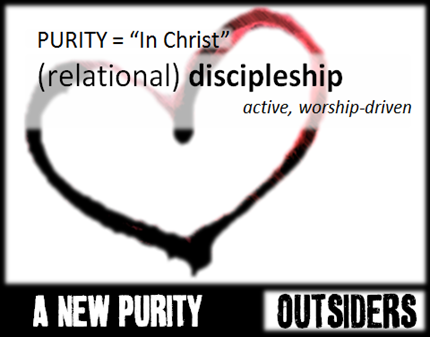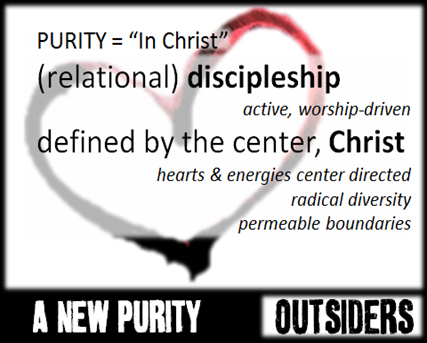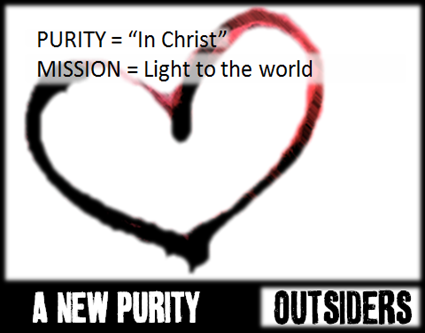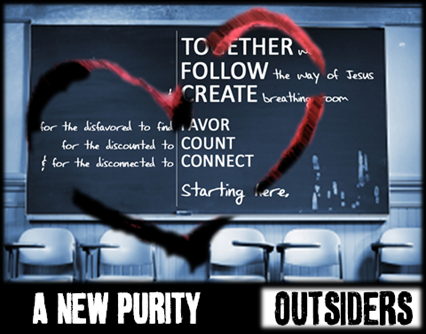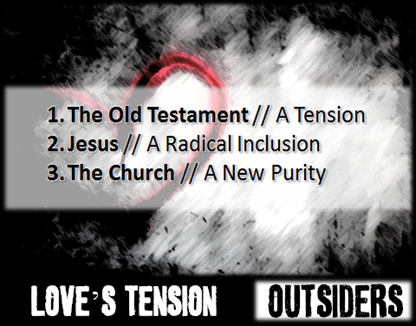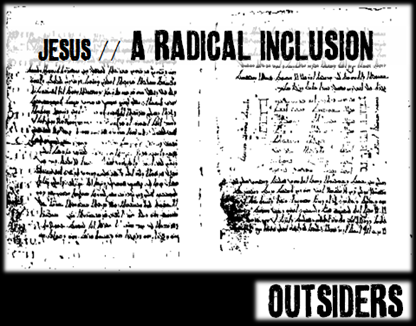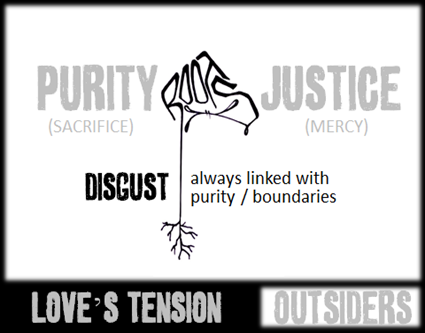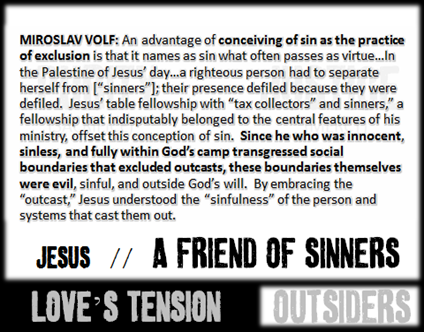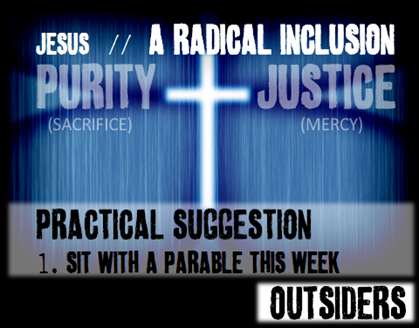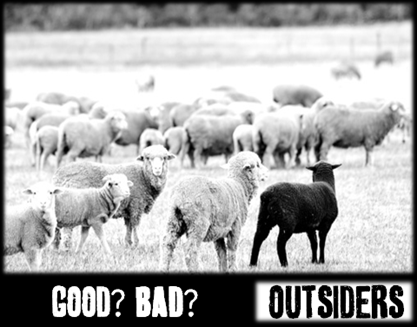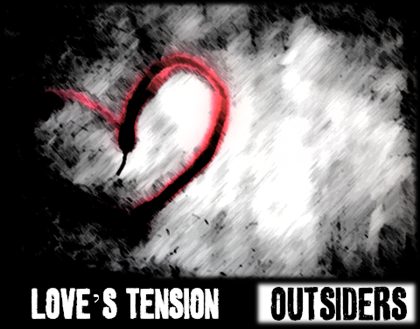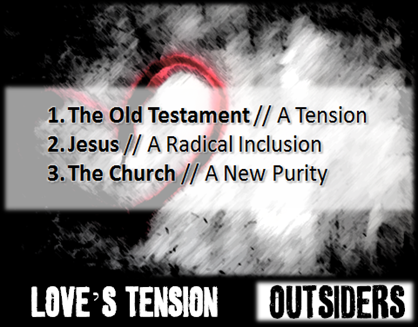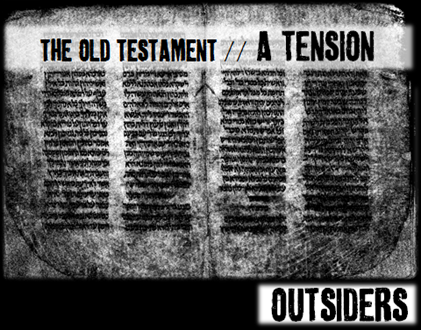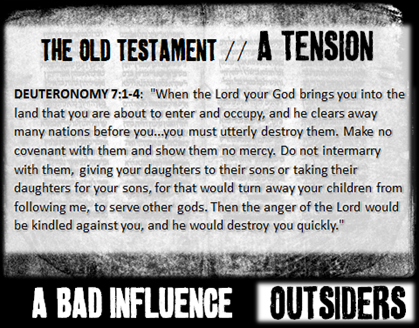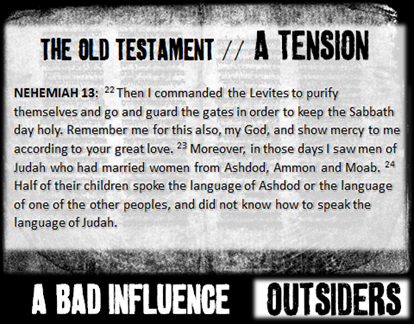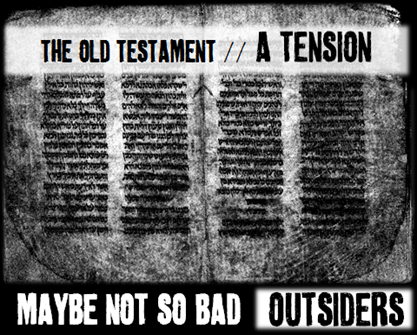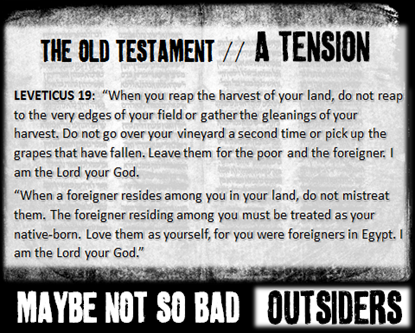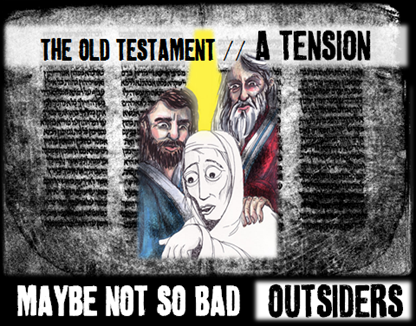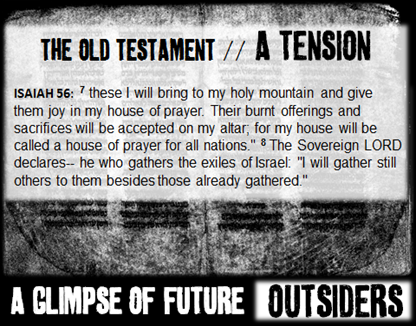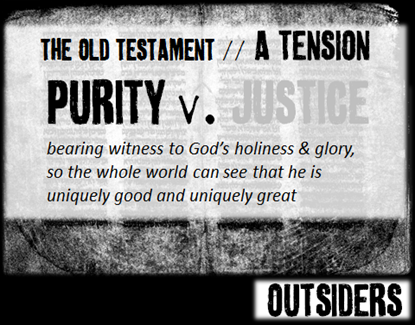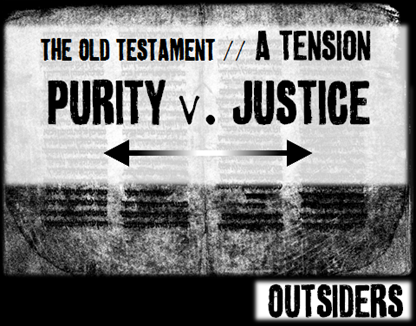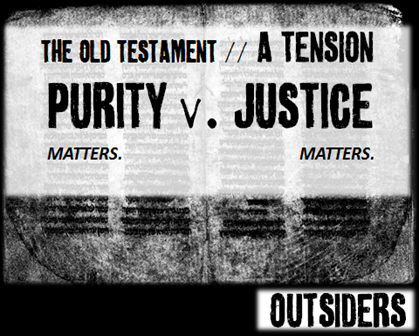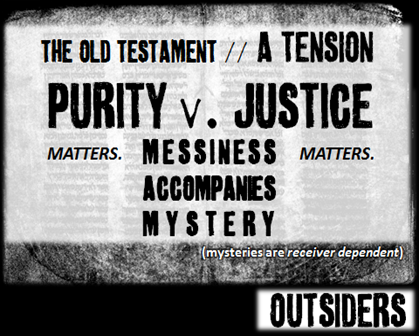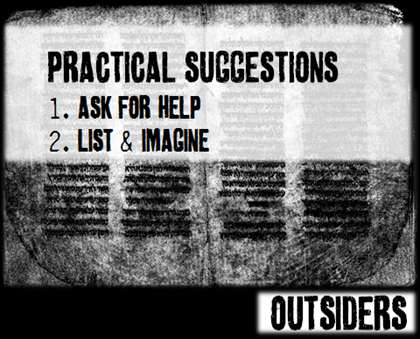sermon notes from the Vineyard Church of Milan 08/25/2013
video available at www.sundaystreams.com/go/MilanVineyard/ondemand
podcast here: http://feeds.feedburner.com/VineyardChurchOfMilan
or via iTunes here: https://itunes.apple.com/us/podcast/vineyard-church-of-milan/id562567379
Preview – Jesus embraces everyone; that makes us nervous for all kinds of reasons. What if we lose our “saltiness”, our distinctive flavor in the attempt to love everyone? What if outsiders become a bad influence on us? Take heart – there is a new purity “in Christ” that is just as resistant to contamination as Jesus’ resurrection body is resistant to death and decay. Because there is a new creation at work in us, and that new creation empowers us to practice the same kind of radical hospitality that Jesus does, without fear of losing our purity. Our purity comes from remaining “in Christ” and that happens by continued movement in the right direction, and not by getting everything right all the time. Phew! Let’s invite everyone to join us in this party – Jesus is bringing the wine.
Now onto the sermon proper…
Disgust is at the root of Love’s tension.
Disgust is always a boundary emotion. When something is inside of us, it’s not subject to disgust; if it’s outside of us, and we perceive it as a threat to our selves, disgust makes us want to get it away, to exclude it from our selves, so that it can’t harm us, contaminate us.
Love overrides disgust. Love causes us to relax or suspend disgust so that an outsider can be embraced.
Disgust gets triggered for us in three areas, setting up love’s tension. Social, Animal-Reminder, Moral. Social: somebody is different than we are with respect to culture, personality type, economic background, race, ethnicity, nationality, skills, talents, interests, etc. Will disgust (no matter how minor or subtle) cause us to keep them at a distance, or will love move us to embrace them? Animal-Reminder: something about somebody reminds us of our fundamental neediness and / or mortality as animals (deformity, sickness, poverty, decay, poor hygiene, hunger, etc.). Will disgust cause us to keep them at a distance, or will love move us to embrace them? Moral: Somebody acts or thinks in ways that seem wrong somehow to us. Will disgust cause us to keep them at a distance, or will love move us to embrace them?
We encounter love’s tension where love & disgust go toe to toe. Your child’s diaper stinks to high heaven. Your husband’s sweaty clothes in the laundry bin. The food bits in your aging dad’s beard as you greet him at the door to his apartment. Your teenage son’s terrible music and fashion (if it can even be called fashion!). Your granddaughter’s boyfriend of a different race. Your friend’s body ravaged by cancer, making them nearly unrecognizable. Your neighbor’s religious convictions. Your employee’s unwise lifestyle choices. The bumper stickers on you Uncle’s car (maybe they are political, maybe supporting a different school, maybe Calvin pissing on a something you love). The homeless person on the corner.
We’re not going to be making the argument that Love should win; I’m going to assume most of us want Love to win.
After all, if we are here, we are at least curious about Jesus, who seemed to find a way for Love to win over disgust in all kinds of surprising situations and circumstances. On the social spectrum, his love moved him to embrace Gentiles, Romans, Samaritans, the poor, the rich, the simple, the sophisticated, men and women, young children and wise veterans of life. On the animal-reminder spectrum, he embraced lepers, the blind, paralyzed, diseased, poor, bleeding, deformed, dying, and even the dead. He embraced death itself, even. On the moral spectrum, he embraced traitors, thieves, drunkards, rebels, murderers, adulterers, prostitutes, the ritually unclean, even the demonized, not to mention you, and me.
No, we won’t be making the argument of why we should follow Jesus in dismantling disgust for Love’s sake. Rather, today we are trying to figure out how we can do it without our integrity becoming compromised, without losing our purity as children of God, without losing our distinctiveness as the family of God – as it says in the scriptures, without becoming salt that loses its saltiness. How do we remain a light for the world while opening our hearts to the world wrapped in the darkness of night? Sure, Jesus did it. And he shined brighter and brighter. His purity was never diminished. But Jesus is Jesus, for heaven’s sake. Perfect. And we’re broken people. Aren’t we? Well, yes, we are. Mostly. Only mostly. And it’s that “mostly” which makes all the difference for this discussion. Because Jesus is calling his followers to a New Purity that is different from the kind of purity we usually imagine. And it’s a purity we already have, in him.
Hold that thought, for now.
Today we’re going to talk about the church, this new community of Radically Inclusive insiders that forms around Jesus, and the New Purity that it is called to as it participates with Jesus in his saving love at work in our broken world. As perhaps you can imagine, it’s no small bite to chew. Next week we’ll finish up this series by exploring what you and I, all of us together, can actually do in light of all we’ve been talking about, some spiritual practices that help us become the kind of people Jesus is calling us to become in this area. That should be fun, and a nice change of pace. Today, however, we’re still wrapping our minds and hearts around this important and tension filled topic. We’ve got a lot to cover, so buckle your seat belts, batten down the hatches, hold on to your hats, shut the front door, milk the cows, put your tray tables in a locked and upright position.
There are two main questions we have to answer, or at the very least, explore the answers to.
1. The first question is: how does the community organized around and led by Jesus maintain its integrity?
2. And the second question is this: in light of that, how does the community organized around and led by Jesus join his mission of Radical Inclusion?
(One might suggest that the order of the questions should be flipped, that mission should precede integrity, but in this case at least, and maybe all others, mission flows from integrity. Jesus after all, is Love, and his mission therefore, is a mission of love. In a similar way, the mission of the church flows from her identity. Your mission and my mission flow from our identity.)
Remember, in the Old Testament, the purity or integrity of God’s family – the Jewish people – is maintained through Israel’s faithfulness to a code of behavior, the commandments of God codified in the Law, and by vigilantly separating itself from impurities that threatened its integrity when it violated that code.
Purity in the New Testament is a function of being “In Christ.” It’s no longer a function of a code, nor a separation from impurity. It’s a function of our relationship to a person.
This idea of being “In Christ” is basically the idea that the purity of a follower of Jesus doesn’t flow from that follower herself, but rather, it flows from Jesus’ purity. Jesus is perfectly pure, at every level. Heart, soul, mind, strength. Love through and through. His integrity is unassailable, tested, tried, crucified and found not wanting. And so any human being – all of whom have varying degrees of impurity, of fractured integrity – who has entrusted himself to Christ and his saving work on the cross, finds that she or he is a new creation “in Christ.” She finds that Jesus has made in her (for her?) a new self, one that shares in his resurrection life, out of the ashes of her old self, an old self that is being put to death bit by bit as she shares in his crucifixion. This, of course, is mystery and mystical, and yet, at the same time, it is nonetheless profoundly real and pregnant with practical implications.
Paul writes about it in one of his letters to the believers in Corinth when he says:
Therefore, if anyone is in Christ, the new creation has come: The old has gone, the new is here!
2 Corinthians 5:17
Or in his letter to the church in Ephesus:
You were taught, with regard to your former way of life, to put off your old self, which is being corrupted by its deceitful desires; 23to be made new in the attitude of your minds; 24and to put on the new self, created to be like God in true righteousness and holiness.
Ephesians 4:22-23
All that to say, the new creation in us, that is now us in the truest sense, is pure not because our behavior is perfect, or because we are separated from contaminants, but because we are “in Christ.”
Listen to Jesus talk about the new purity in John 15:
15 “I am the true vine, and my Father is the gardener. 2He cuts off every branch in me that bears no fruit, while every branch that does bear fruit he prunes so that it will be even more fruitful. 3You are already clean because of the word I have spoken to you. 4Remain in me, as I also remain in you. No branch can bear fruit by itself; it must remain in the vine. Neither can you bear fruit unless you remain in me.
5“I am the vine; you are the branches. If you remain in me and I in you, you will bear much fruit; apart from me you can do nothing. 6If you do not remain in me, you are like a branch that is thrown away and withers; such branches are picked up, thrown into the fire and burned. 7If you remain in me and my words remain in you, ask whatever you wish, and it will be done for you. 8This is to my Father’s glory, that you bear much fruit, showing yourselves to be my disciples.
9“As the Father has loved me, so have I loved you. Now remain in my love. 10If you keep my commands, you will remain in my love, just as I have kept my Father’s commands and remain in his love.
Do you see all the purity language present here as Jesus talks about his disciples being “in Him?” He cuts off every branch... He prunes… You are clean… Thrown away…thrown in the fire and burned… All of those purity references are connected to being “in Him.” Jesus is establishing a new conception of purity for humanity. And it’s a direct extension of his own purity. You will remain in my love, just as I remain in his love.
Jesus’ purity is the sort that is unthreatened by sin and death. Jesus’ purity is rooted in God’s Love and nothing else. As a result, he can practice a radical inclusion, dismantling disgust’s boundaries, and embrace sinful people without concern for being contaminated by their sin. He wants us to share in that same new kind of purity, so that we can follow him in his saving mission to every corner of the broken creation.
(Note: As “spiritual” as this might sound, this isn’t that far removed from our everyday experiences, actually. Purity is about protecting the self, so that the self can fulfil its purpose. As relational beings, our self-identity is in part a function of our relationships. When our relationships change, our identity changes, and so does our purpose. When you become a parent, for example, your identity changes as a result of your relationship to a child, and so does your purpose. And because purity and self-identity are linked, it’s not a stretch to imagine that relationship with divinity might change both one’s self-identity and how purity works.)
This new purity – remaining in God’s love – is the only kind that matters in the new creation. Listen to what Paul says about it in Galatians 5:2-6:
2Mark my words! I, Paul, tell you that if you let yourselves be circumcised, Christ will be of no value to you at all. 3Again I declare to every man who lets himself be circumcised that he is obligated to obey the whole law. 4You who are trying to be justified by the law have been alienated from Christ; you have fallen away from grace. 5But by faith we eagerly await through the Spirit the righteousness for which we hope. 6For in Christ Jesus neither circumcision nor uncircumcision has any value. The only thing that counts is faith expressing itself through love.
Circumcision was the old mark of purity. Obedience to the law was the way that purity was maintained. Not so with the new purity. The mark of the new purity is faith expressing itself through love. It is maintained by being “in Christ Jesus.”
Essential to the new purity “in Christ” are 2 components.
The first is relational discipleship (responsiveness to the leading of Christ through the Holy Spirit, taking step after step in obedience). This is how one remains “in Christ.”
(relational) Discipleship is an active, worship driven enterprise. It’s not a set it and forget it directional course. It is neither “justice” nor “morality”. It will always lead in both of those directions, but it is energized by surrendered, attentive, dependent, loving relationship with Jesus that bears fruit in acts of justice (*faith expressing itself through love…) and a transformed inner person (*Put to death, therefore, whatever belongs to your earthly nature…). The Holy Spirit is the counselor that directs and empowers discipleship. Brothers and sisters are the community that fosters, encourages, learns discipleship together.
One of the impacts of the reformation is that Christianity moved in one of two directions: Justice or Purity. On the liberal end, it became all about justice; that is, it became all about goodness as treating one’s neighbor rightly. Loving one’s neighbor became equivalent to loving God, and effectively, replaced loving God. On the conservative end, it became all about personal moral goodness; that is it became all about sexual purity, doctrinal purity, ethical purity. Pursuing moral purity became equivalent to loving God, and the best way to love one’s neighbor was to help them become pure. In the extreme examples of both cases, liberal and conservative, the need for a living, breathing relationship with Jesus is minimized.
Jesus is inviting us to become his disciples again. To be in the kind of intentional, day to day relationship with him where he can send us out to others with a radical embrace, outside of our comfort zones. Where he can call us to put to death some part of our old creation selves, despite the vigorous protests of our flesh. Where he can reveal to us his radical love for another and move us to repentance for our hard hearts toward them. Where he can reveal to us his radical love for us and move us to repentance for our fear and anxiety. Where he reveals to each of us, individually, who we truly are, our new creation selves, in him.
The second essential component of the New Purity “in Christ” is a commitment to defining the community by its center, which is Christ. The community is made up of those whose hearts (internal compasses?) are pointed towards the center, and whose energies are harnessed to move ever closer to the center. It is therefore the attractiveness and initiative of Christ that forms this community, and thus it is characterized by radical diversity, not homogeneity. And its boundaries (where they exist, and such as they are) are permeable, not impermeable.
Are you drawn towards Jesus as best as you understand him and using your energies to move towards him as best as you know how? Then you are included. Do you not understand him very well yet? No matter. The community is here to share what it has learned so far. And to learn from you what you have learned. Have you not moved very close to him yet? No matter. The community is here to help you with your next step, as God gives you faith to take it. Do you not know what the next step Jesus has for you is yet? No matter. The community is here to share what it has learned about listening. And to share what steps Jesus has shown it to take, inasmuch as it might help you discern Jesus’ voice in your life.
This requires resistance to attempts to re-define the community in any other way. With any other center. Or any other schema (socio-moral boundaries, for example). Note: as individual followers of Jesus, we’d do well to resist defining ourselves any other way, too. We are who we are, in Christ, because of our relationship to him. Because of the attraction of our hearts and the direction of our energies. Not because of our score on the “looks like a Christian should look” test.
It also means a resistance to the participation (and especially leadership) of would-be members whose hearts are pointed away from the center, and whose energies are harnessed to move away from the center (or, for that matter, to point or move others away from the center). This resistance, of course, happens in the context of the love which is at the center of the community, so it is predicated on the dismantling of the disgust boundaries that prevent love. Every would-be member of the community of Jesus is met with a posture of love, and out of that love discernment is exercised about what kind of discipline best maintains the integrity of the community and participates in Christ’s love towards the would-be member. This is perhaps most analogous to how a loving family would treat a family member engaged in destructive behavior.
The toxic impact of disgust on human beings is that it produces the kind of exclusion that dehumanizes. Christ has come to re-humanize human beings ravaged by sin, so disgust works at cross purposes to his saving work. It must be kept in check, regulated. Although exclusion remains as an acceptable (but rarely exercised) option for maintaining the New Purity, it is different than the exclusion produced by disgust. It doesn’t discount the image of God in the person (you’re dead to me!), but rather respects it, and grieves the loss of fellowship, maintaining the vulnerability and will to embrace that grief reveals. And it is not permanent; it maintains a hope of future inclusion, predicated only by repentance (a redirection of the heart and energized movement).
Ok, so we’ve got a new identity, in Christ. And we have a new purity, in Christ. So what’s the mission, the calling? The same as it’s always been – to be a Light to the world. How that light shines, though, is new in light of our new identity. It shines by displaying Christ in the love of his followers.
Our primary tool for shining that light is Hospitality. Hospitality (Christ’s radical inclusion) functions both as the light and the welcome “into” Christ. Christ is seen in the act of hospitality. He is seen in the community and loving fellowship at work therein.
Welcoming strangers is where it’s at for the church. God himself is identified with the three strangers that Abraham extends hospitality to by the Oaks of Mamre in the Old Testament. It’s what Jesus did when he ate with sinners, and in the end, it’s what led to his death. We are supposed to do the same.
Jesus links himself to strangers in Matthew 25. When we welcome the least of these (the hungry, the thirsty, the stranger, the naked, the sick, the imprisoned), we welcome him. Notice how those groups tick the check boxes on the three kinds of disgust…
When we welcome children, we welcome him. Again, our embrace of kids is one of the primary ways we overcome disgust with Love in our normal experience.
The parable of the Good Samaritan is all about true Hospitality. The Samaritan overrides disgust with love on all three fronts – the Jew is enemy to the Samaritan, the Jew is morally suspect to the Samaritan, and the Jew is a reminder of mortality because of his injuries and helplessness. And yet the Samaritan practices radical hospitality out of love. (Interestingly, the ones who pass the injured man by, do so because of purity / disgust concerns.)
The kind of hospitality we are called to practice is costly, as the Good Samaritan’s was. Purity in Christ isn’t threatened, but the self does expose itself to pain, trauma, loss, diminishment even. This was Jesus’ experience. It was the Father’s experience. It’s not the end of the story; resurrection is always the end of the story for those who are “in Christ.” But along the way. Today. Tomorrow. Love may well cost us something. Something precious even. Our life. Our situation in the world. In some way, the well-being of the other is how we define our self-hood. It’s Jesus’ name even – YHWH is Salvation.
Hospitality is where the re-humanization of human beings ravaged by sin and a sinful world begins. Hospitality – Jesus Brand Hospitality – matters. We cannot let disgust of any sort keep us from practicing it. God desires mercy, not sacrifice. Because in Christ, the sacrifice is complete. It’s time for Christ’s body, the church – that’s us – to become a living sacrifice. Jesus Brand Hospitality is our spiritual act of worship.
This is why our assignment from Jesus is what it is. Together we follow the way of Jesus, creating breathing room for the disfavored to find favor, for the discounted to count, for the disconnected to connect. Starting here.
Practical Suggestions:
1. Read Colossians 3:1-11 and reflect on the connections between disgust, purity, boundaries, and new creation in Christ. My written notes online will have comments if they are helpful.
3 If then you have been raised with Christ, seek the things that are above, where Christ is, seated at the right hand of God. 2 Set your minds on things that are above, not on things that are on earth. 3 For you have died, and your life is hidden with Christ in God. 4 When Christ who is your life appears, then you also will appear with him in glory.
5 Put to death therefore what is earthly in you: sexual immorality, impurity, passion, evil desire, and covetousness, which is idolatry. 6 On account of these the wrath of God is coming. 7 In these you too once walked, when you were living in them. 8 But now you must put them all away: anger, wrath, malice, slander, and obscene talk from your mouth. 9 Do not lie to one another, seeing that you have put off the old self with its practices 10 and have put on the new self, which is being renewed in knowledge after the image of its creator. 11 Here there is not Greek and Jew, circumcised and uncircumcised, barbarian, Scythian, slave, free; but Christ is all, and in all.
Colossians 3:1-11
Vertical dimension connected to purity / heavenly good (no disgust) earthly bad (much disgust). And yet death (the ultimate earthly reality) is the doorway to being raised with Christ. And our response to the sinfulness in us (the hindrances the old purity) is to put it death, to put it away from us. Our disgust is applied selectively to our old selves, and embrace is applied to our new selves. And the boundaries that used to divide us into insiders and outsiders (Greek / Jew, Circumcised / uncircumcised, etc.) are now dismantled and all that remains is Christ, all in all. Paul is subverting our old disgust responses at the heart of the old purity, establishing a new conception of purity “in Christ.”
2. Challenge your Disgust. Help out in a ministry that expresses hospitality and requires you to relax or suspend your disgust response out of love. Children’s, youth, compassion, foot massage, for example.
3. Eat with a stranger at the Summer Splash.


